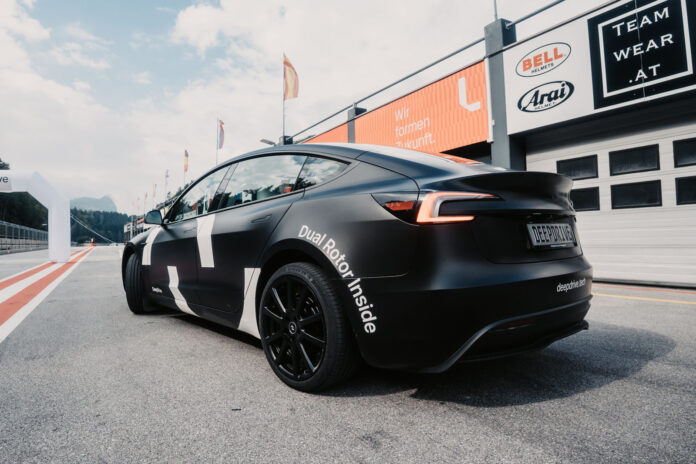Deepdrive, a Munich-based electric motor research company, has begun public trials of a range of in-wheel automotive drive motors that, it claims, can bring new standards of efficiency and economy to car propulsion.
The new motors, being tested initially in Volvo and Tesla prototypes on the Salzburgring racing circuit, will eventually allow manufacturers to build EVs that are up to 20% more efficient, and with much greater space efficiency enabling “never seen” proportions, according to the firm.
Speaking at the recent Munich motor show, chief engineer Alex Rosen, one of the founders of Deepdrive, told Autocar that the company plans to scale up for “small series” car production by 2028 and has customers waiting for its products.
It has already acquired around €50 million (£43.5m) in investment funding from backers such as Volkswagen and BMW to assist in the establishment of pilot production facilities.
Rosen acknowledged previous problems of weight and complexity with in-wheel motors but said Deepdrive’s research and innovations have reduced these to a point where production is feasible and economic.
Deepdrive was formed in 2021 by a group of seven ambitious young engineers, most of whom already knew one another through their participation in a Formula Student team at university in Munich.
After graduation, the partners began working for very large German technology groups and they were “obsessed” by what they saw as the huge potential of in-wheel drive motors. However, they became frustrated by their employers’ sheer size and consequent slowness to innovate and Deepdrive was formed as a result.
“Developing in-wheel motors was our original big idea,” says Rosen. “We believed – and still do – that the potential was huge, even if rival EV drive systems have upped their game over the past four years.
“When we started, the efficiency of conventional on-board EV drive systems was awful. Most were affected by around 40% of losses associated with heat and transmission friction. Today, it’s more like 25%, but this still leaves us a huge margin to work with.”
“As well as energy effi ciency, in-wheel motors have other big advantages,” says Rosen. “We can deliver great performance, very accurate torque vectoring and we can save packaging space. All-wheel drive is almost a given and so is very effective regenerative braking.”
More recently, Deepdrive has also developed and patented a unique form of dual-rotor motor, much lighter than the two single-rotor motors it can replace but nevertheless more suitable than in-wheel motors for what Rosen terms “central drive”, a conventional on-board location. Rosen acknowledges that the theory of twin-rotor motors isn’t new but says Deepdrive is first to develop technology to make it work.
